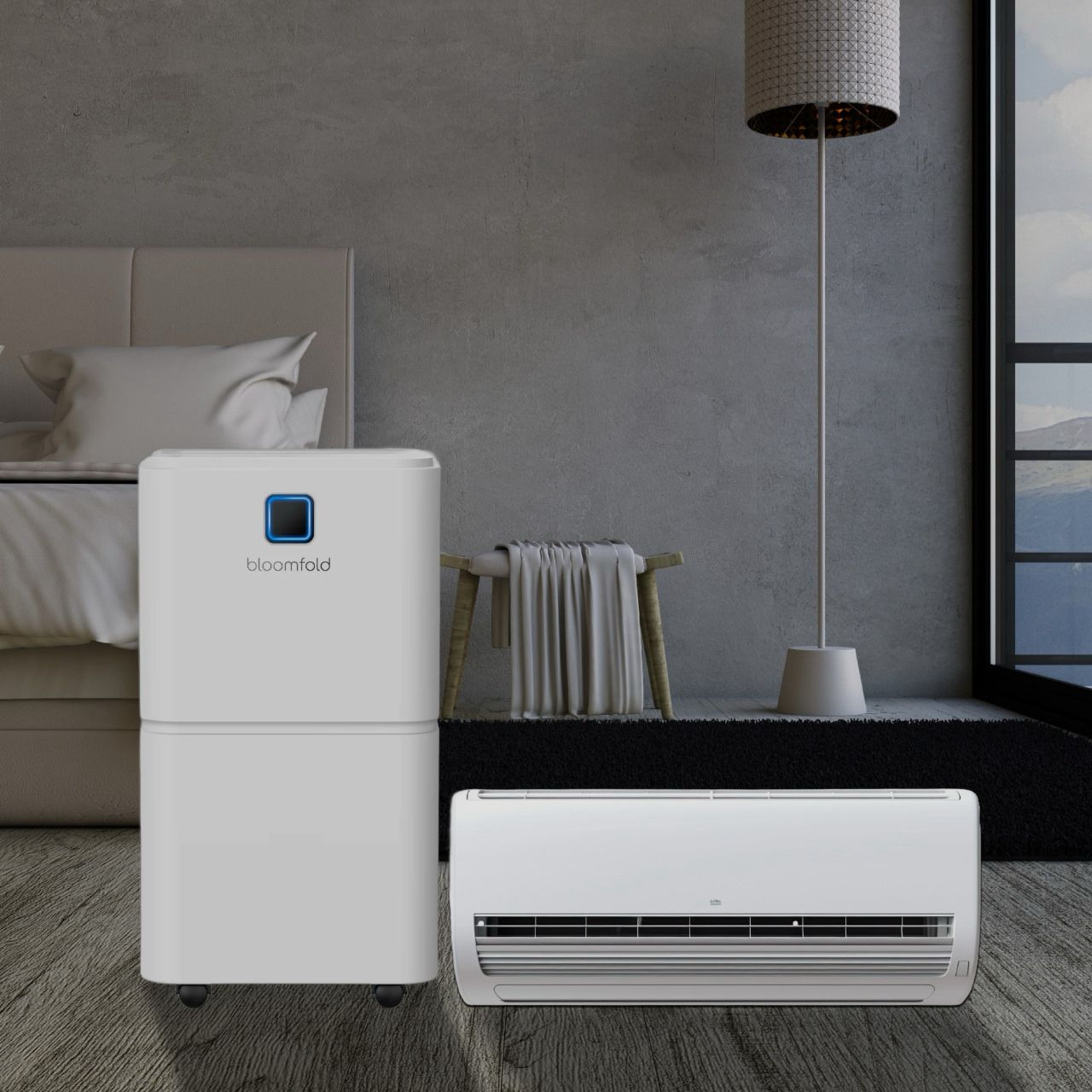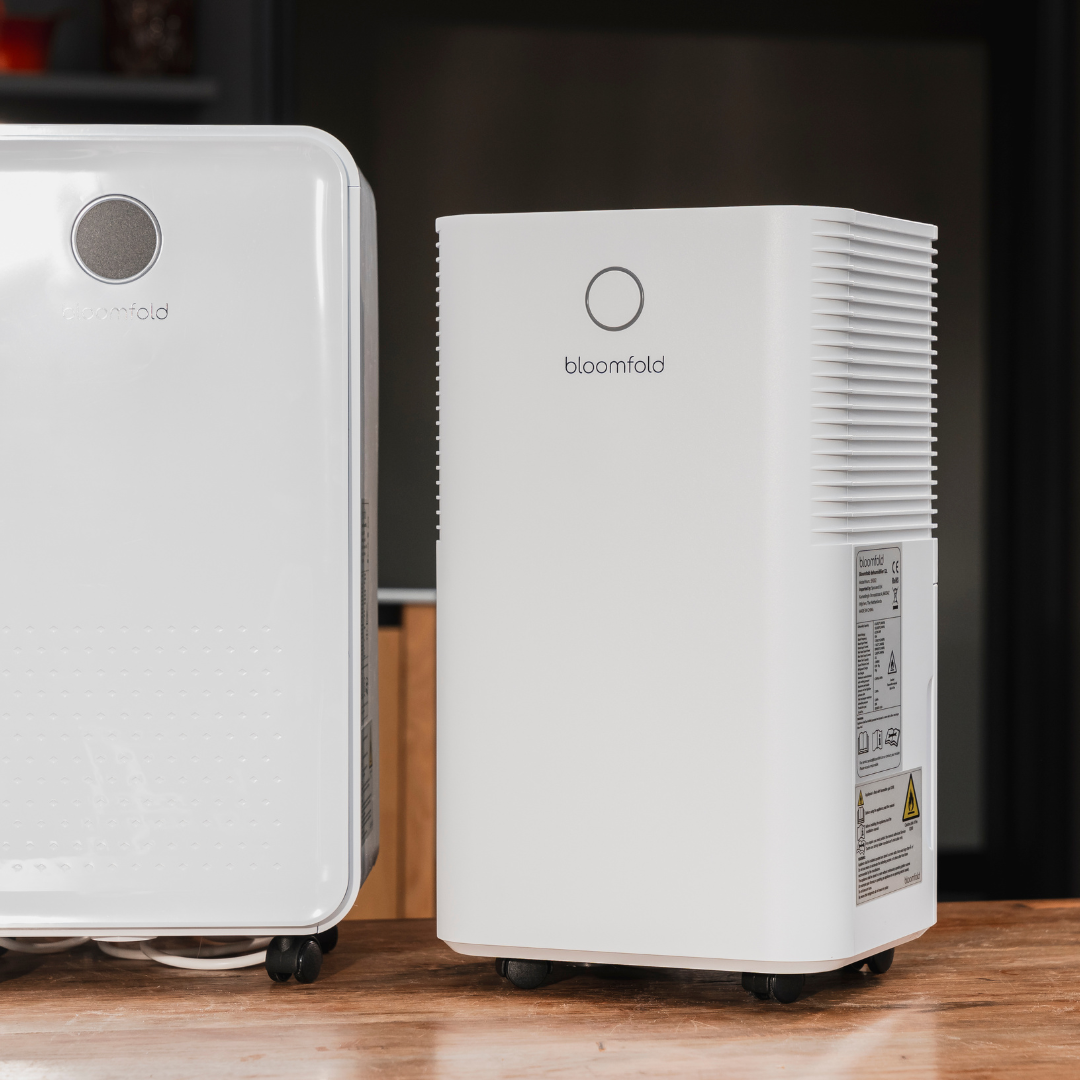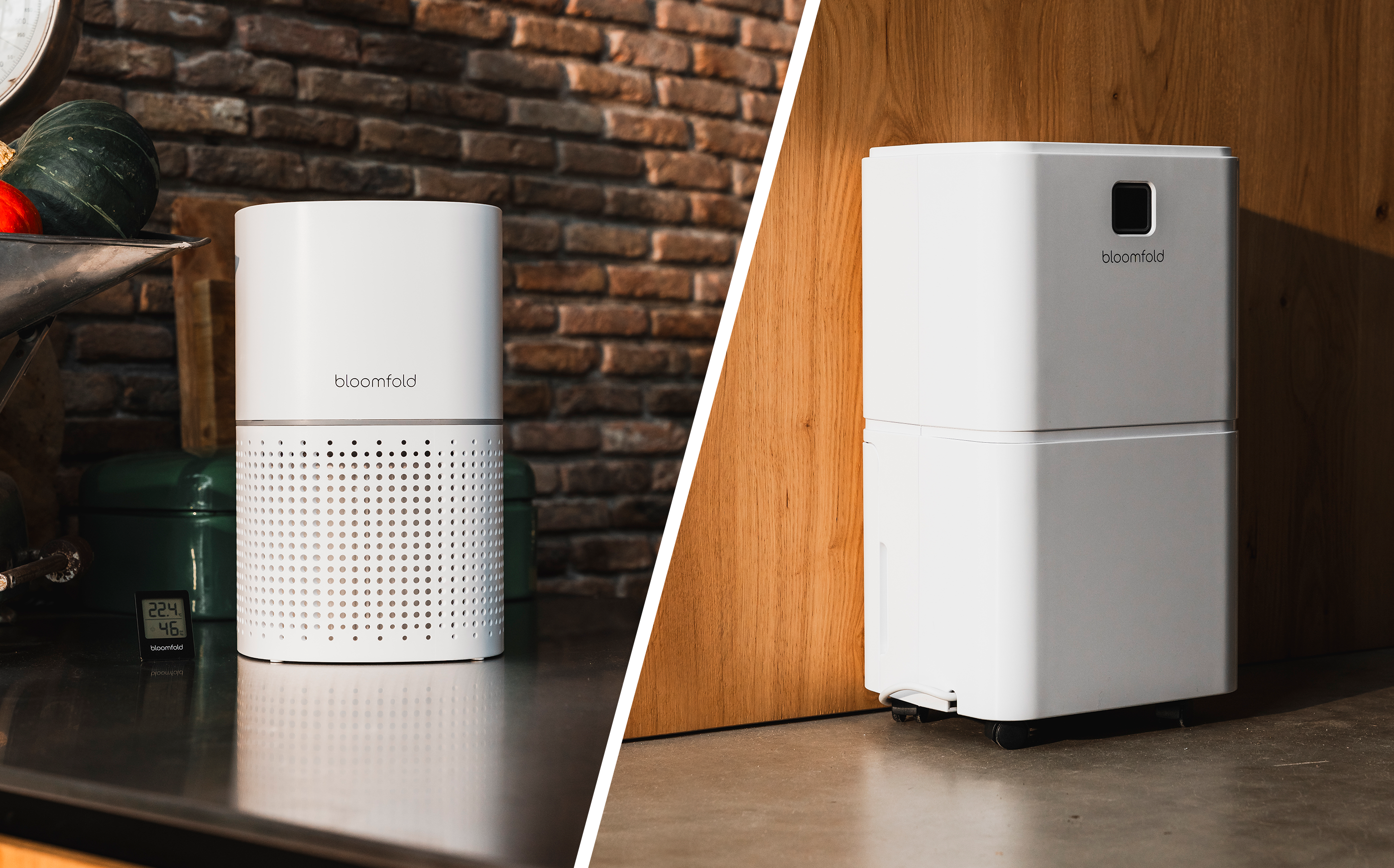Are you looking for ways to improve comfort in the house?
Many homeowners wonder: do I have to purchase a dehumidifier or an air conditioner?
The choice between these two devices depends on your specific situation.
Think of factors such as:
- humidity,
- temperature,
- use of space,
- budget.
In recent years we see that more and more people are opting for products that are specifically tailored to their living environment. For example, a dehumidifier tackles moisture problems in cellars, while air conditioning remains popular during hot summer days. To help you make a well -considered decision, we will look at which solution best suits your situation.
Table of contents
- In short:
- What is dehumidification and why is it important?
- How do humidifiers and air conditioners work?
- What is a dehumidifier?
- What is an air conditioner?
- Advantages and disadvantages of dehumidifiers and air conditioners
- Prices of dehumidifiers and air conditioners
- Consequences of damp air
- Air conditioning or dehumidifier? When which solution:
- Conclusion
- Frequently asked questions about dehumidifier or air conditioning
In short:
- Choose one dehumidifier If you want to fight moisture problems, such as fungus, condensation and musty scents. Ideal for spaces such as cellars and bathrooms.
- Choose one air conditioning If you want a cool, comfortable temperature in the house, especially in the summer. Perfect for living room and bedrooms.
Are you dealing with heat and a high humidity? A dehumidifier can be the solution you are looking for. With a dehumidifier you create a more comfortable and healthier indoor climate. Consider this practical solution if you suffer from a stuffy or damp feeling in the house.
What is dehumidification and why is it important?
Dehumidifies is the process in which excess moisture is removed from the air. This is important because moist air can lead to all kinds of problems in the house, such as fungal formation, wood rot and other trouble.
Good humidity is important for a healthy and comfortable indoor climate. If the humidity is too high, this can lead to a stuffy feeling and health problems, such as allergies and breathing problems. By dehumidifying the air, you ensure a pleasant living environment and you prevent damage to your home and furniture.
How do humidifiers and air conditioners work?
Deer degraders and air conditioners are both aimed at improving the indoor climate, but they do this in different ways. A dehumidifier works by sucking damp air and cooling it. As a result, the moisture condenses and is collected in a water bowl or drained through a hose. The dry air is then blown back into the room, which ensures a lower humidity.
Air conditioners, on the other hand, have a dual function. They cool the air and dehumid it at the same time. A fixed air conditioning consists of an indoor unit and an outdoor unit. The indoor unit extracts heat and moisture from the air, after which the outdoor unit drains this heat out. This not only reduces the temperature, but also the humidity is slightly reduced. Mobile air conditioners work in a similar way, but are generally less efficient than fixed air conditioners.
What is a dehumidifier?
Air dehumidifiers with a dehumidifier
A dehumidifier is a handy device that helps to lower the humidity in the house. By removing excess moisture from the air, you prevent problems such as:
- Mold formation on walls and ceilings
- Condensation on windows
- Musty scents in rooms
Do you suffer from too high humidity? A dehumidifier can offer a practical solution. It not only improves air quality, but also helps to make your house more comfortable and healthier.
Operation:
- Sucks damp air.
- Cools the air, so that the air condenses.
- Dry air is blown back in the room.
- The collected water is stored or drained through a hose.
Typical user situations:
- Cellars, bathrooms or poorly ventilated rooms.
- Protection of furniture and walls against moisture damage.
What is an air conditioner?
Cooling with an air conditioning unit
An air conditioner, or air conditioning, is specially designed to lower the temperature in a room. Did you know that it also helps to reduce the humidity slightly? However, this is an additional advantage and not the main task of the air conditioning.
Operation:
- Removes heat from the air with the help of a coolant.
- Drains the heat out through an outdoor unit. The outdoor unit also drains excess moisture, which is important for the dehumidification function of the air conditioning.
- Blasted air blows back into the space. This cool air contributes to lowering the humidity, because cool air retains less moisture.
- Some models have a separate dehumidification function.
Typical user situations:
- Bedrooms, offices and living rooms during hot summer days.
- Ideal for temperature control and comfort.
Advantages and disadvantages of dehumidifiers and air conditioners
|
Feature |
Air conditioning |
Dehumidifier |
Bloomfold dehumidifier |
|---|---|---|---|
|
Function |
Temperature control, with slight dehumidification as a side effect. |
Specifically designed to prevent moisture problems. |
Specifically designed to prevent moisture problems. |
|
Energy consumption |
❌ Higher consumption through the cooling process and the regulation of palpable heat. |
✅ Energy efficient, because no heat is removed. |
✅ Energy efficient, because no heat is removed. |
|
Temperature effect |
❄️ actively lowers the temperature and regulates humidity. |
🌡 No significant temperature drop, only drier air. |
🌡 No significant temperature drop, only drier air. |
|
Cost |
💎 More expensive to purchase and use (especially fixed systems such as single Split air conditioning and Multi Split air conditioning). |
💰 Affordable to purchase and energy efficient. |
💰 Affordable to purchase and energy efficient. |
|
Mobility |
❌ Installation required; Mobile air conditioners are movable. |
✅ Compact and easily movable. |
✅ Compact and easily movable. |
|
Best for |
🌞 Warm spaces where temperature control is important. |
🛠 Damp areas such as cellars and bathrooms. |
🛠 Damp areas such as cellars and bathrooms. 💨Optimizing indoor climate. |
|
Other |
- |
- |
🔒⌛ sleeping, timer, washing dry function, children's lock & stylish design 🤫 whisper silence compared to air conditioners and other dehumidifiers |
- Energy consumption: Do you want to use a device daily? Then choose an energy -efficient dehumidifier to save on your energy costs.
- Temperature effect: On dry, warm summer days, an air conditioner is the best choice for maximum comfort in the house. Keep in mind that an air conditioner can also reduce the humidity.
- Cost: Do you work with a smaller budget? A dehumidifier is an affordable and practical solution that offers many benefits.
Prices of dehumidifiers and air conditioners
The costs of dehumidifiers and air conditioners can vary greatly depending on the type and capacity of the device. In general, dehumidifiers are cheaper to purchase and use air conditioners. This is because dehumidifiers have a simpler mechanism and use less energy. Air conditioners, on the other hand, offer extra functions such as cooling and sometimes even heating, which can increase the price.
It is important to consider your specific needs when choosing a device. If you mainly want to tackle moisture problems, a dehumidifier is a cost -efficient choice.
|
Product |
Mobile air conditioning |
Air conditioner |
Other dehumidifier |
Bloomfold dehumidifier |
|
Price |
€300 ~ €800 |
€ 1,500 ~ € 3,500 (incl. Installation) |
€ 299 to € 349* |
€239* |
*Based on 20l dehumidifier
Consequences of damp air
Moist air can cause a series of problems in the house. Too high humidity can lead to mold, wood rot and general moisture damage to walls, ceilings and floors. This can not only damage your home, but also cause health problems, such as allergies and breathing problems. Good humidity is therefore important for a healthy and comfortable indoor climate. By regulating the humidity in the house with a dehumidifier or air conditioning, you can create a pleasant and healthy living environment.
Air conditioning or air independent? When which solution:
Choose one air conditioning if ..
- You suffer from hot summer days.
- Warmth lingers in the house for a long time.
- Temperature control The most important thing is for your comfort and a good night's sleep.
In this case, an air conditioner can help you to tolerate the heat better and to make your living environment more pleasant.
Choose one dehumidifier If ...
- You suffer from moisture problems, such as mold or musty scents.
- Moisture lingers in the air for a long time.
- You are looking for a simple and affordable solution, without hassle with installation.
So ..
Both devices have their unique benefits, but the choice depends on your specific needs.
- Moisture problems? Go for a dehumidifier.
- Warmth and comfort? Choose one air conditioning.
View our efficient dehumidifiers And discover how they can make your house comfortable and healthy. Are you looking for the perfect dehumidifier? View our Bloomfold 12L dehumidifier Halo.
Frequently asked questions about dehumidifier or air conditioning
What are the benefits of a dehumidifier?
A dehumidifier is a practical solution for a healthier and more comfortable indoor climate. Why would you consider one?
- Prevent mold formation: Reduce excess moisture in the house and keep walls and furniture free of mold.
- Limit moisture damage: Protect your home against damage to walls, ceilings and floors.
- Create a healthier living environment: Reduce allergens, such as house dust mites, and breathe cleaner air.
With a dehumidifier you can easily tackle moisture problems and make your indoor climate more pleasant.
What is the difference between a dehumidifier and an air conditioner?
A dehumidifier reduces the moisture in the air, making a space drier and more comfortable. Handy with high humidity to prevent mold and moisture problems.
An air conditioner controls the temperature and actively cools the space. Ideal for creating a cool, pleasant environment during hot days.
Tip: Choose a dehumidifier if you mainly want to tackle moisture problems, and an air conditioner if you find temperature control important. Or combine them for the best of both!
Which option is better for fungal problems due to damp air?
A dehumidifier is a smart solution to prevent mold formation. Why? Because it is specially designed to tackle moisture problems. Are you dealing with a damp space? Then consider a dehumidifier to lower the humidity and not give fungus a chance.
Is a dehumidifier cheaper than an air conditioner?
Yes, dehumidifiers are generally a cheaper choice than air conditioners, both in purchase and in use.
Can an air conditioning also dehumidify?
Did you know that an air conditioner can also remove moisture from the air? This happens when a side effect of cooling, but it is less efficient than a dehumidifier. However, many fixed air conditioners have the option to regulate humidity, which contributes to better air quality in the house. If you specifically suffer from moisture in the house, a dehumidifier is a more effective solution. So consider what you need for your situation.
Can I use a dehumidifier in a bedroom?
Absolute! Horny dehumidifiers are an excellent choice for bedrooms, thanks to their silent operation and compact design. Do you want a relaxing night's sleep and a healthier air quality? A dehumidifier can be a practical solution. When choosing at the noise level and size, so that the device fits perfectly with your bedroom.







Leave a comment
This site is protected by hCaptcha and the hCaptcha Privacy Policy and Terms of Service apply.